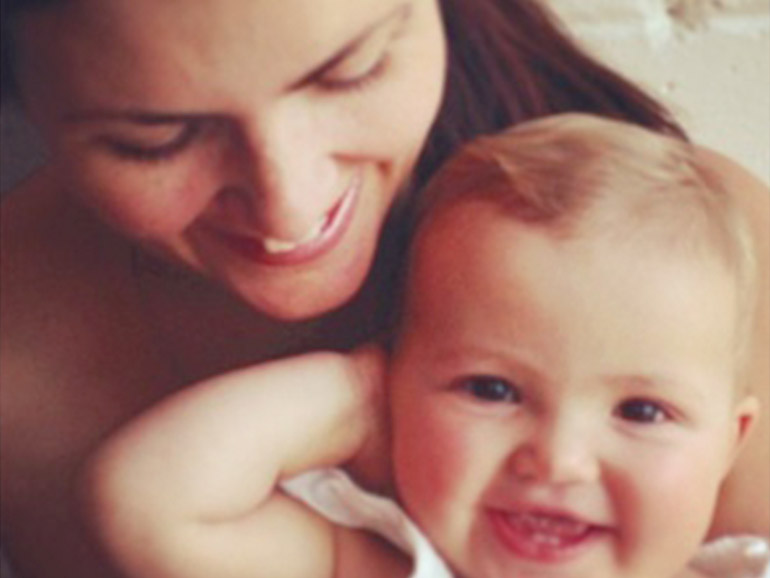Pregnancy Means 1,000 Days of Eating Better for My Baby (And for Me)
This post originally appeared on WhattoExpect.com on May 7, 2014
The question people ask me most these days is “you’re still pregnant?” As if the answer weren’t obvious (hello, huge belly and swollen feet), I tell them yes, only X number of weeks/days/hours to go. In case you’re wondering, right now I am 12 days away from my due date.
But I am not a fan of the pregnancy countdown as, IMHO, it puts way too much emphasis on the destination (baby’s birth) and does not honor the journey that mom and baby walk together every step of the way during pregnancy.
Pregnancy truly is an amazing journey—for both mom and baby. This is something I’ve learned on an emotional and visceral level through both of my own pregnancies. And I’ve also learned it first-hand in my work as Executive Director of 1,000 Days, an advocacy movement dedicated to improving nutrition for moms and babies during the 1,000 days between pregnancy and a child’s 2nd birthday. My job requires me to understand the science behind fetal development and how mom’s nutritional choices during pregnancy (and even before) could impact her baby’s future health.
Mom As Nutritional Gatekeeper
During my first pregnancy, I was overwhelmed by the newness of it all—the physical sensations, the realization that I was about to become a mother, and the endless to-do lists in preparation for baby.
This time around I’ve had the opportunity to really think about how every aspect of my unborn child’s development is shaped by two factors: genetics and the environment I create for my baby in my body. And here’s the kicker—there is not much we can do about genetics or even about certain factors having to do with mom’s health or her age. But there is one thing we expectant moms can influence greatly—baby’s nutrition.
As moms we are the nutritional gatekeepers for our children starting in pregnancy. The scientific and medical communities are realizing just how much this matters to a child’s lifelong health and development, and there is now a growing area of research that specifically looks at how the quality of mom’s nutrition before and during pregnancy can positively or negatively affect her unborn child’s future health. Researchers have theorized that poor nutrition during pregnancy can predispose a child to diabetes, obesity, heart disease and certain types of cancers, for example.
In this way, pregnancy is not simply about growing a baby for nine (ten) months; it is also a window of opportunity to shape a child’s lifelong health.
“Eat For You, Not for Two”
For me, pregnancy has been an opportunity to become more mindful of what—and how much—I eat. Admittedly, when I first learned I was pregnant, I secretly thought to myself, “Hooray! I can finally eat whatever I want!” But I soon learned that as my baby’s nutritional gatekeeper, I was most certainly NOT supposed to be “eating for two.” “Eat for you, not for two” was probably the most important piece of advice I received, because the truth is, developing babies don’t need their own super-sized helping of calories (especially those empty ones that come from sugar); they need proteins and nutrients that come from the food you eat.
When it came to eating for me, while I certainly gave into my cravings for chocolate milkshakes and French fries more than I probably should have, I made sure to incorporate into my weekly diet foods like fish, salads made with spinach, and nuts. While these foods never topped my list of crave-worthy treats, they are packed with the kinds of nutrients that are great building blocks for a baby’s development. I also tried to include as much fresh food as I could in my pregnancy diet—avoiding in particular foods loaded with preservatives and artificial colors.
The Next Step in My Pregnancy Journey
Knowing that I had such an important role to play in shaping the development of my baby’s brain and body—together with the amazing experience of seeing my baby’s heart beat inside my body during my sonograms—has made me truly appreciate the journey of pregnancy.
So now, despite the fact that the journey has not always been easy, and that as I am in my final weeks of pregnancy I can’t seem to get comfortable or get a good night’s sleep no matter how hard I try, I am still not in a hurry to get to the destination.
I will miss having my body be my baby’s home and his or her source of nourishment. I do take comfort in knowing, however, that I will still be my baby’s nutritional gatekeeper, especially as we embark on our next big journey together—breastfeeding!
Lucy Martinez Sullivan is the Executive Director of 1,000 Days. Follow Lucy on Twitter@LucyMSullivan.


